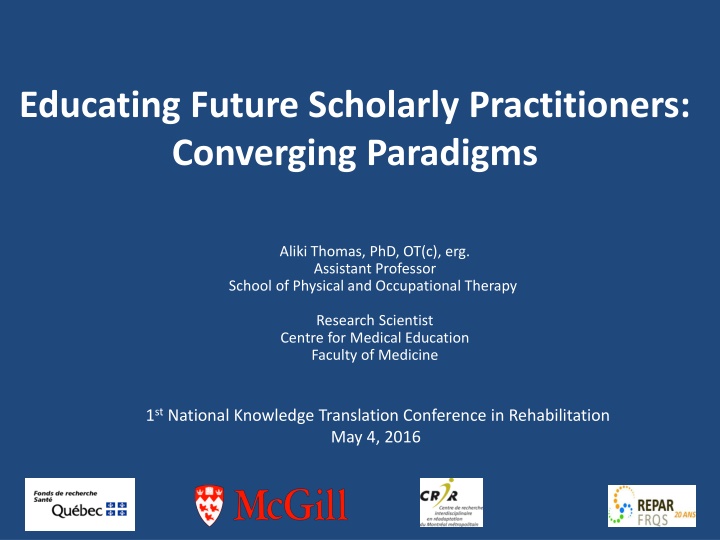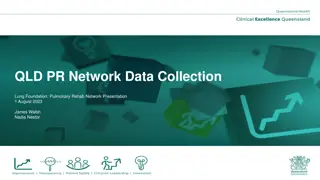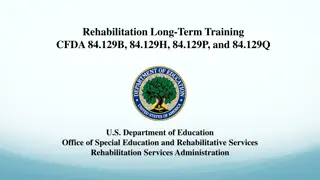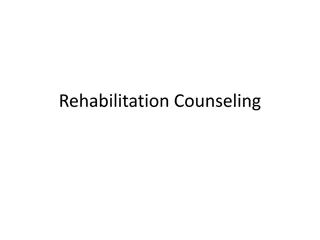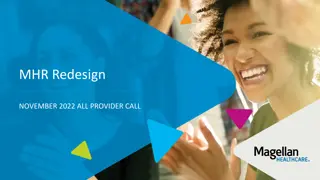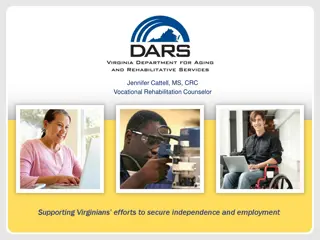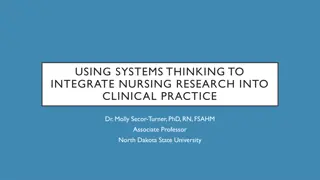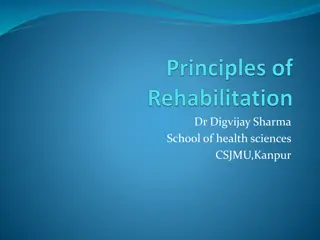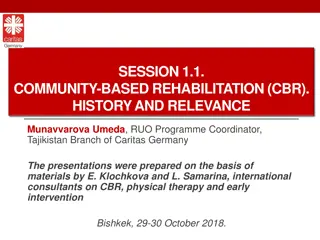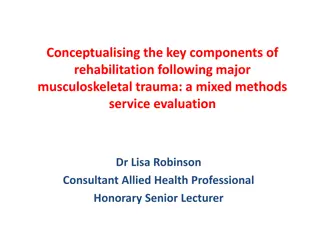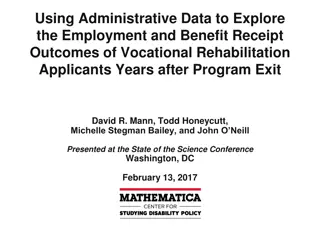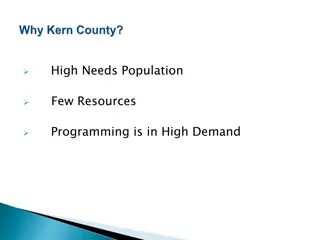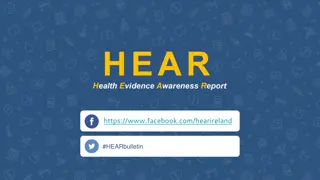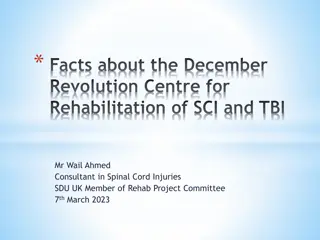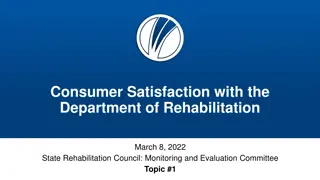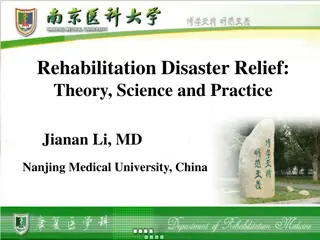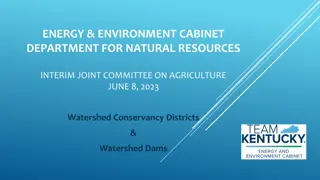Enhancing Evidence-Based Practice in Rehabilitation Education
This presentation by Dr. Aliki Thomas highlights the importance of integrating evidence-based practice (EBP) into rehabilitation education. It discusses the need for better knowledge translation in entry-level programs, promising strategies, and the characteristics of scholarly practitioners in occupational and physical therapy. The focus is on equipping graduates with the skills to apply research evidence in practice effectively.
Download Presentation

Please find below an Image/Link to download the presentation.
The content on the website is provided AS IS for your information and personal use only. It may not be sold, licensed, or shared on other websites without obtaining consent from the author.If you encounter any issues during the download, it is possible that the publisher has removed the file from their server.
You are allowed to download the files provided on this website for personal or commercial use, subject to the condition that they are used lawfully. All files are the property of their respective owners.
The content on the website is provided AS IS for your information and personal use only. It may not be sold, licensed, or shared on other websites without obtaining consent from the author.
E N D
Presentation Transcript
Educating Future Scholarly Practitioners: Converging Paradigms Aliki Thomas, PhD, OT(c), erg. Assistant Professor School of Physical and Occupational Therapy Research Scientist Centre for Medical Education Faculty of Medicine 1st National Knowledge Translation Conference in Rehabilitation May 4, 2016
Key Questions and Messages Entry-level instruction on evidence-based practice (EBP) in isolation : a disservice to our graduates ? Limited knowledge translation (KT) content in entry-level rehabilitation programs ? Promising strategies and educational initiatives ?
The Scholarly Practitioner OCCUPATIONAL THERAPY PHYSICAL THERAPY Profile of OT practice in Canada (2012) Essential competency profile for physiotherapy in Canada (2012
Characteristics of the Scholarly Practitioner Profile of OT practice in Canada (2012), Essential competency profile for physiotherapy in Canada (2012) Uses a reflective approach to practice, lifelong learning Engages in scholarly inquiry Bases work on the best evidence from research, best practices, experiential knowledge Maintains/enhances competence through ongoing learning Designs/implements systems to support competency, ongoing professional development Evaluates information to support client, service, practice decisions with ease and efficiency Supports use of best evidence, and the distribution and translation of new knowledge into practice KT Committed to facilitate learning, contribute to the creation, dissemination, application, and translation of knowledge
Canadian OT and PT Educational Programs EBP as a focal point in all curricula Increased emphasis with move to Master entry-level research methods courses research projects Instructional design and assessment of EBP
Effectiveness of Teaching EBP in Health Sciences Programs Know how to ask a PICO question, search and appraise the literature Attitudes towards EBP generally favorable Self-efficacy + Decision making stage Variability in performance function of experience Impact of fieldwork placements generally negative (Crabtree et al., 2012; Dizon et al., 2012; Hecht et al., 2016; Thomas et al., 2013; Young et al., 2014; Wong et al., 2013)
Local Context Perceptions towards the teaching practices and assessment of EBP within the curriculum and impact of curriculum on EBP self-efficacy Mixed methods study Cross sectional survey of 4 student cohorts and new grads OT students (n=115, 56%) Focus group with senior students (Thomas, Lu, Osler, Turnbull & Douglas, submitted)
Results Thematic analysis Mixed feelings about the value of EBP Barriers to the application of EBP Opposing worlds: EBP contrasts Vital and imperfect role of the curriculum
Potential Interpretation Students and new graduates unprepared to: Understand and analyze research-practice gaps Contribute to reducing research-practice gaps
Disempowered and disillusioned students and young clinicians?
A Disconnect Professional programs focus primarily on EBP Insufficient attention to KT Most KT courses, content, training: graduate programs targeting graduate students, post docs, junior faculty KT Canada summer institutes, seminar series, Sick Kids KT certificates: build capacity in KT and KT research
Strategies for Educational Programs Prepare them early, often! Instruction on EBP and KT explicit links between EBP and KT beyond searching and appraising evidence recognize gaps, reasons for gaps Integrative approach KT is contextualized (e.g. pediatrics course) KT courses during professional education mandatory content electives
Leveraging Other Competencies Curricula designed to promote change agent and advocate as vehicles for the scholar Provide evidence of successful implementation efforts, changes in practice, impact on patient outcomes Lighting a fire Champions Exemplars New graduates and seasoned clinicians
Back to the Local Context -educational initiatives- 1. Curricular mapping of scholar role in our programs 2. Professional electives redesigned with KT as a cross cutting theme 3. Professional master s research projects 4. Graduate course in KT
5. Scholarship of Practice School of Physical and Occupational Therapy built meaningful partnerships between our educators, researchers, the students, clinicians, decision-makers and health service consumers. These partnerships enable us to interweave theory, education, research and practice such that each element informs the other .ensures that our teaching is evidence-informed and clinically meaningful, that our scientific discoveries are clinically relevant and that our practitioners are scholarly agents of change. Collectively we aim to improve the health and participation of all members of Quebec society through a scholarship of practice model. Finalyson et al., 2005; Forsyth et al; 2005; Kielhofner, 2005 a,b; Melton et al., 2010; Taylor et al., 2005; Wimpenny e tal., 2010;
Thank you Merci aliki.thomas@mcgill.ca
